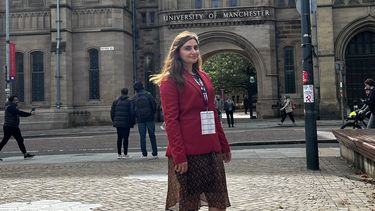Over the past few months, I've had the privilege of attending three major conferences that align with my thesis work—one in Porto, Portugal (European Sociological Association), and two in the UK, in Leeds (Critical Disability Studies) and Manchester (British Educational Research Association). Juggling these academic commitments while traveling with my 8-year-old son was both rewarding and challenging. The ESA conference stood out for its family-friendly environment, providing accessible spaces for mothers and even organizing a camp for children, which made the experience much smoother. Prioritizing the establishment of a child-friendly environment during university events can enhance parental comfort[1]. Although the other two conferences presented more logistical challenges, the support of close friends in Sheffield helped me navigate them, allowing me to fully engage. In Porto, I was captivated by the city's beauty, its delicious food, and the first sight of the Atlantic Ocean. More importantly, the conference sessions sparked rich discussions on inclusive education with researchers from around the world. These debates have made me reconsider whether we even need a term like "inclusive education"—perhaps education, by its very nature, should always be inclusive, without the need for a special label. This experience deepened my understanding of the global conversation on inclusive education, reinforcing that even in highly developed countries, the concept remains a critical and evolving issue.
During the Critical Disability Studies conference in Leeds, I had the exciting opportunity to meet several researchers whose work I’ve long admired and cited in my own presentations. I invited one of these scholars to attend my session, which led to a deep and stimulating discussion on applying decolonization theory in the post-Soviet context. This was a pivotal conversation for me, as it helped explore how decolonization could inform the development and implementation of inclusive education policies in Azerbaijan, my home country. In my presentation, I emphasized the idea of a "decolonization of the mind" (Wa Thiong'o,1998) as a potential pathway for advancing inclusive education, sparking crucial questions about how to translate this theory into practice. Specifically, I reflected on how we could leverage three key theoretical frameworks—double consciousness by W. E. B. DuBois (1989), theories of justice (Fraser, 2013), and Edward Said’s concept of decolonization (1978)—to create more equitable and inclusive educational systems in post-Soviet regions. This discussion has profoundly influenced my thinking on how theoretical approaches can offer concrete solutions to the challenges of inclusive education in complex cultural and historical contexts.
At the BERA conference, in addition to connecting with new researchers in the field of inclusive education, I had the honor of presenting my work, which had been shortlisted for a Special Interest Group (SIG) prize by the committee. While the competition and high standards brought a bit of stress, the experience was incredibly rewarding. My presentation centered on Azerbaijan’s inclusive education reform, exploring the country’s legal framework and the broader research landscape within the post-Soviet context. We discussed how educators in Azerbaijan often shift from a medical model of disability to a social model in their approach to inclusive education, however, today the social model of disability has been a topic of dispute in Disability Studies (Mallett and Runswick-Cole, 2014). This led to a rich conversation on how Critical Disability Studies can help address these gaps, as Goodley states “critical disability studies which start with a disability but never end with it” (2013, p.632), and how decolonization theory offers a pathway to creating a model of inclusive education that better fits the unique challenges and realities of post-Soviet societies like Azerbaijan. The discussions reinforced the need for a more nuanced approach that not only adapts existing theories but also acknowledges the local context in crafting inclusive education reforms.
To summarize my reflections, I am inspired by Ainscow's idea[2]I came across this during one of his talks on YouTube, where he emphasized that inclusive education is not just a policy but a process, a principle that has to inform all policies, including curriculum, assessment, accountability, teacher education, etc. It is a journey, every country is at a different stage of this journey, and it is crucial that they adapt the concept of inclusivity to their own unique contexts and features. Rather than adopting a one-size-fits-all approach, nations must continuously assess and adjust how inclusive education works within their specific situations, making it an ongoing process of learning and improvement. This perspective resonates deeply with my research, particularly as I explore how theories like decolonization can help shape inclusive education in post-Soviet contexts like Azerbaijan.
References:
Fraser, N. 2013. Fortunes of Feminism: From State-Managed Capitalism to Neoliberal Crisis. London: Verso.
Goodley, D. (2013). Dis/entangling critical disability studies. Disability & Society, 28(5), 631-644.
Mallett, R., & Runswick-Cole, K. (2014). Approaching disability: Critical issues and perspectives. Routledge.
Wa Thiong'o, N. (1998). Decolonizing the mind. Diogenes, 46(184), 101-104.
Gilroy, P. (1993). The black Atlantic: Modernity and double consciousness. Harvard UP.


